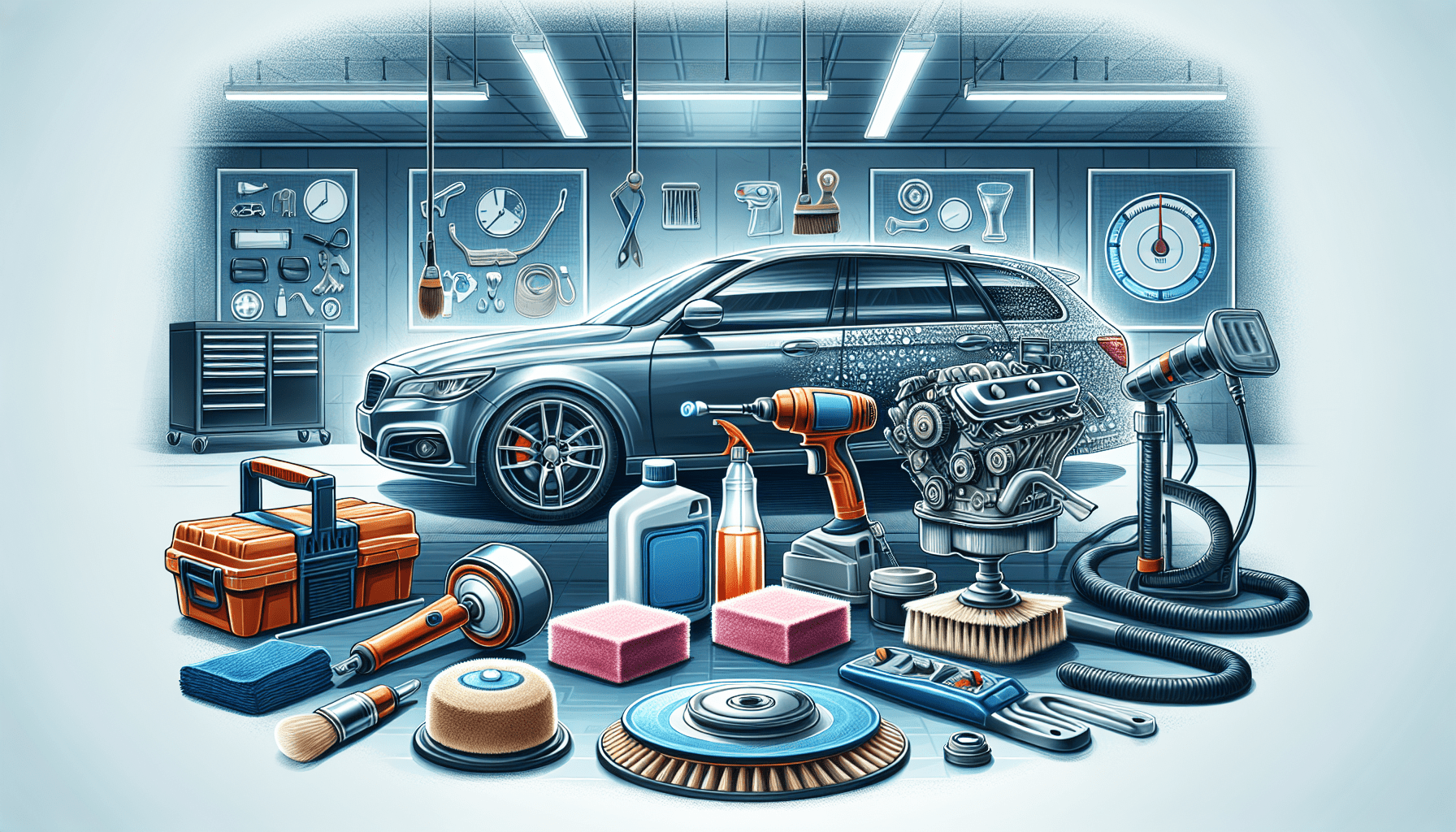Ace Mobile
Detailing

What Are The Top 7 Benefits Of Auto Detailing For Improving Fuel Efficiency?
Are you curious about how auto detailing can actually improve fuel efficiency? Look no further! In this article, we will explore the top 7 benefits of auto detailing and how they can help boost your vehicle’s fuel efficiency. From removing excess weight to enhancing aerodynamics, these techniques can not only make your car look great but also save you money at the pump. So, if you’re ready to learn more about how detailing your vehicle can improve fuel efficiency, let’s get started!

Removal of Excess Weight
Removing dirt and clutter
When it comes to improving fuel efficiency, one of the first steps you can take is to remove any excess weight from your vehicle. Over time, dirt and clutter can accumulate in your car, adding unnecessary pounds to the overall weight. By regularly cleaning out your vehicle and getting rid of any dirt or clutter, you can lighten the load and improve fuel efficiency. Take a few minutes each week to clean out the interior of your car, removing any trash or unnecessary items that may be weighing it down.
Cleaning out the trunk and interior compartments
In addition to removing dirt and clutter inside the car, it’s also important to clean out the trunk and any other interior compartments. Often, we tend to use our trunk as a storage area for various items, and this can add unnecessary weight to the vehicle. Take the time to clean out your trunk and remove any items that you don’t need to have with you at all times. This simple step can help improve fuel efficiency and ensure that your vehicle is operating at its best.
Removing unnecessary accessories
Another way to reduce excess weight and improve fuel efficiency is to remove any unnecessary accessories from your vehicle. While accessories like roof racks, bike racks, and spoilers may enhance the appearance of your car, they can also create drag and increase fuel consumption. Evaluate the accessories you have installed on your vehicle and consider removing any that are not essential. By doing so, you can reduce drag and improve your vehicle’s aerodynamics, ultimately leading to better fuel efficiency.
Improved Aerodynamics
Washing and waxing the exterior
Keeping the exterior of your vehicle clean not only improves its appearance, but it also plays a significant role in improving fuel efficiency. When your car is dirty, the dirt and grime can create additional drag, making it harder for your vehicle to move through the air. By regularly washing and waxing your car, you can remove dirt and debris, resulting in a smoother surface that reduces drag. Invest in a high-quality car washing and waxing kit and make it a regular part of your car maintenance routine to optimize your vehicle’s aerodynamics and fuel efficiency.
Removing dirt and debris from undercarriage
While washing the exterior of your car is important, it’s also crucial to pay attention to the undercarriage. The undercarriage of your vehicle can collect dirt, debris, and road salt, which can impact the vehicle’s aerodynamics. This buildup can create drag and cause your car to work harder to maintain speed, ultimately reducing fuel efficiency. Regularly inspect and clean the undercarriage of your vehicle to ensure that it remains free from dirt and debris, allowing for improved aerodynamics and fuel efficiency.
Cleaning the wheels and tires
In addition to washing the exterior and undercarriage of your vehicle, it’s important to pay attention to your wheels and tires. Clean wheels and properly inflated tires can improve fuel efficiency by reducing rolling resistance. When tires are dirty, they can accumulate brake dust and other contaminants that can increase rolling resistance, making it harder for your vehicle to move forward. Regularly clean your wheels and tires using a gentle, non-abrasive cleaner, and ensure that your tires are properly inflated. This simple step can go a long way in improving your vehicle’s fuel efficiency.
Proper Tire Maintenance
Checking tire pressure regularly
One of the most important aspects of maintaining fuel efficiency is ensuring that your tires are properly inflated. Underinflated tires can increase rolling resistance, causing your vehicle to work harder and use more fuel. On the other hand, overinflated tires can reduce traction and lead to uneven wear. It’s crucial to regularly check the tire pressure and inflate or deflate accordingly to meet the manufacturer’s recommended PSI (pounds per square inch). By keeping your tires properly inflated, you can maximize fuel efficiency and extend the life of your tires.
Rotating tires for even wear
Another essential aspect of tire maintenance is rotating them regularly. Tires wear unevenly depending on their position on your vehicle, which can lead to reduced fuel efficiency and a shorter tire lifespan. By rotating your tires according to the recommended schedule in your vehicle’s owner’s manual, you can ensure that they wear evenly and maintain optimal performance. This simple maintenance task can have a significant impact on improving fuel efficiency and prolonging the life of your tires.
Keeping tires clean
In addition to checking tire pressure and rotating tires, it’s important to keep them clean. Dirt, debris, and grime can accumulate on your tires and affect their performance. Regularly washing your tires and using a specialized tire cleaner can help remove any contaminants that can impact fuel efficiency. Additionally, keeping your tires clean allows you to inspect them for any signs of damage or wear, ensuring that they are in good condition and functioning optimally.
Optimizing Engine Performance
Cleaning the engine bay
Proper engine maintenance is crucial for improving fuel efficiency. Over time, dirt, grease, and debris can accumulate in the engine bay, obstructing airflow and causing the engine to work harder. By regularly cleaning the engine bay, you can remove the dirt and debris, ensuring that the engine can function optimally. Use a gentle degreaser and a soft brush to clean the engine bay, being careful to avoid sensitive components. This simple maintenance task can help improve fuel efficiency and extend the life of your engine.
Changing the air filter
The air filter plays a vital role in the engine’s performance and fuel efficiency. Over time, the air filter can become clogged with dirt, dust, and debris, limiting airflow to the engine. This can result in decreased fuel efficiency and reduced engine performance. It’s important to regularly check the air filter and replace it when necessary. Consult your vehicle’s owner’s manual for the recommended replacement intervals and choose a high-quality air filter that is compatible with your vehicle’s make and model. By changing the air filter regularly, you can optimize engine performance and improve fuel efficiency.
Checking and replacing spark plugs
Spark plugs are essential for the combustion process in the engine. Over time, spark plugs can become worn or dirty, leading to misfires and decreased fuel efficiency. Regularly inspect your vehicle’s spark plugs and check for signs of wear or damage. If necessary, replace them according to the manufacturer’s recommended schedule. High-quality spark plugs can optimize engine performance, enhance fuel efficiency, and improve overall vehicle performance.

Enhanced Fuel Combustion
Cleaning fuel injectors
Fuel injectors are responsible for delivering fuel to the engine’s combustion chamber. Over time, they can become clogged with deposits, affecting fuel spray patterns and fuel combustion efficiency. By cleaning the fuel injectors regularly, you can ensure that fuel is delivered efficiently, resulting in improved fuel combustion and better fuel efficiency. Consider using a fuel injector cleaner additive or have them professionally cleaned for optimal results.
Changing the fuel filter
The fuel filter plays a crucial role in preventing contaminants from reaching the engine and affecting its performance. Over time, the fuel filter can become clogged, reducing fuel flow and affecting fuel combustion efficiency. It’s important to regularly replace the fuel filter to ensure that clean fuel is delivered to the engine. Refer to your vehicle’s owner’s manual for the recommended replacement intervals and choose a high-quality fuel filter that meets the specifications of your vehicle.
Using fuel additives
Fuel additives can also be used to enhance fuel combustion and improve fuel efficiency. There are various fuel additives available on the market, each designed to address specific issues such as deposits, octane enhancement, or lubrication. Adding fuel additives to your gas tank according to the manufacturer’s instructions can help optimize fuel combustion and improve fuel efficiency. Be sure to choose additives that are suitable for your vehicle and consult with a professional if you have any concerns.
Reduced Friction
Lubricating moving parts
Reducing friction is essential for improving fuel efficiency. Proper lubrication of moving parts such as hinges, bearings, and suspension components can significantly reduce friction and improve overall vehicle performance. Regularly inspect and lubricate these parts using manufacturer-recommended lubricants to ensure smooth operation and minimize energy loss due to friction. By reducing friction, you can maximize fuel efficiency and extend the life of your vehicle’s components.
Cleaning and waxing the paint
In addition to lubricating moving parts, it’s important to keep the exterior surfaces of your vehicle clean and protected. Regularly washing and waxing your car can create a smooth surface that reduces drag and minimizes energy loss. By removing dirt and debris and applying a protective wax coating, you can enhance fuel efficiency and maintain the appearance of your vehicle.
Applying ceramic coating
For an extra layer of protection and improved fuel efficiency, consider applying a ceramic coating to your vehicle’s exterior. Ceramic coatings provide a long-lasting and durable barrier that repels dirt, water, and contaminants. By applying a ceramic coating, you can reduce the accumulation of dirt and debris on your car’s surface, resulting in improved aerodynamics and fuel efficiency. Ceramic coatings also offer UV protection and make future cleaning easier, making them a worthwhile investment for both performance and aesthetics.
Improved Cooling System Efficiency
Flushing and refilling coolant
A properly functioning cooling system is crucial for engine performance and fuel efficiency. Over time, coolant can become contaminated with debris and lose its effectiveness, leading to increased engine temperature and decreased fuel efficiency. It’s important to regularly flush and refill the coolant to maintain optimal cooling system efficiency. Consult your vehicle’s owner’s manual or seek professional assistance to ensure that the coolant is replaced at the recommended intervals and that the correct coolant type is used. By keeping the cooling system clean and well-maintained, you can optimize fuel efficiency and prevent overheating.
Cleaning the radiator and fans
The radiator and fans play a vital role in cooling the engine. However, over time, they can become clogged with dirt, leaves, and debris, obstructing airflow and reducing cooling system efficiency. Regularly inspect and clean the radiator and fans to remove any accumulated debris. Use a soft brush or compressed air to gently remove the dirt, being careful not to damage any fragile components. By keeping the radiator and fans clean, you can ensure proper airflow and maintain optimal engine temperatures, ultimately improving fuel efficiency.
Checking and replacing hoses
Hoses in the cooling system are prone to wear and damage over time, leading to coolant leaks and decreased cooling system efficiency. Regularly inspect the hoses for signs of cracks, leaks, or bulges, and replace them as needed. It’s important to use high-quality hoses that are compatible with your vehicle’s make and model. By keeping the hoses in good condition, you can prevent coolant leaks and maintain an efficient cooling system, resulting in improved fuel efficiency.
By following these tips and practicing regular maintenance, you can improve your vehicle’s fuel efficiency and reduce your environmental impact. Remember to consult your vehicle’s owner’s manual for specific maintenance recommendations and always seek professional assistance if you’re unsure about any maintenance tasks. With a little effort and care, you can enjoy a smoother ride, better fuel efficiency, and a greener future. Drive smart, drive efficiently, and enjoy the benefits of a well-maintained vehicle.

